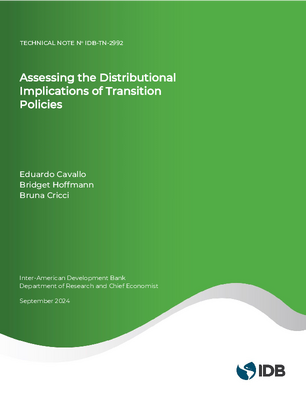Assessing the Distributional Implications of Transition Policies
Date issued
Sep 2024
Subject
Economy;
Climate Change Mitigation;
Energy;
Fossil Fuel;
Mitigation Policy;
Equality;
Renewable Energy;
Mode of Transport;
Agriculture and Food Security;
Science and Technology
JEL code
D63 - Equity, Justice, Inequality, and Other Normative Criteria and Measurement;
H23 - Externalities • Redistributive Effects • Environmental Taxes and Subsidies;
Q20 - Renewable Resources and Conservation: General;
Q28 - Government Policy;
Q38 - Government Policy;
Q48 - Government Policy
Category
Technical Notes
Policies to transition to a low-carbon economy in Latin America and the Caribbean will have important distributional impacts. This article aims to assess how these policies affect different economic sectors and socioeconomic groups and to provide policy recommendations for increasing equity and inclusion. Many of the negative impacts that may exacerbate existing inequalities can be reduced or avoided through policies that compensate citizens for higher prices and worse employment opportunities. Furthermore, well-designed transition policies that have inclusiveness as an explicit goal can promote equal access to the benefits of transition policies. Governments can also take this opportunity to broadly strengthen social protection measures to support workers during concurrent labor market disruptions from automation, artificial intelligence, or other sources.
NO



